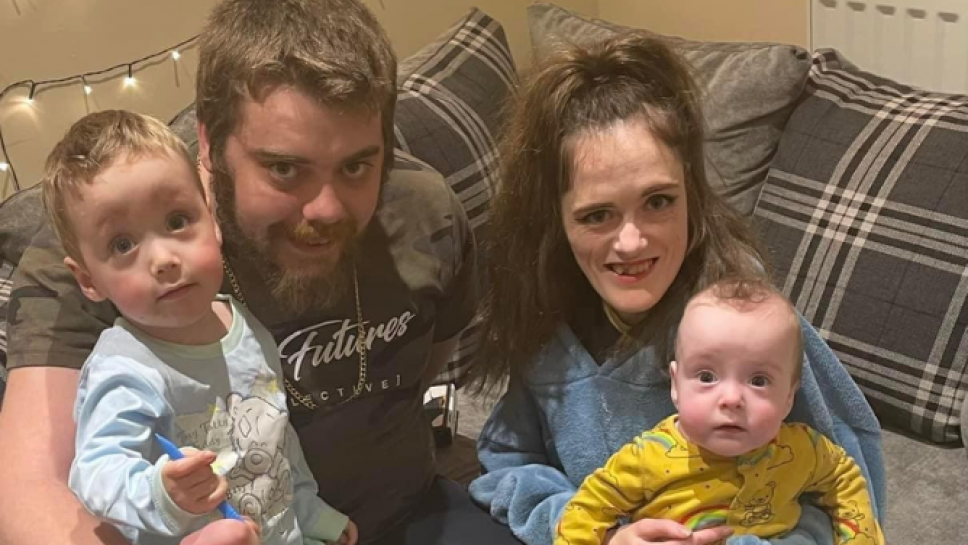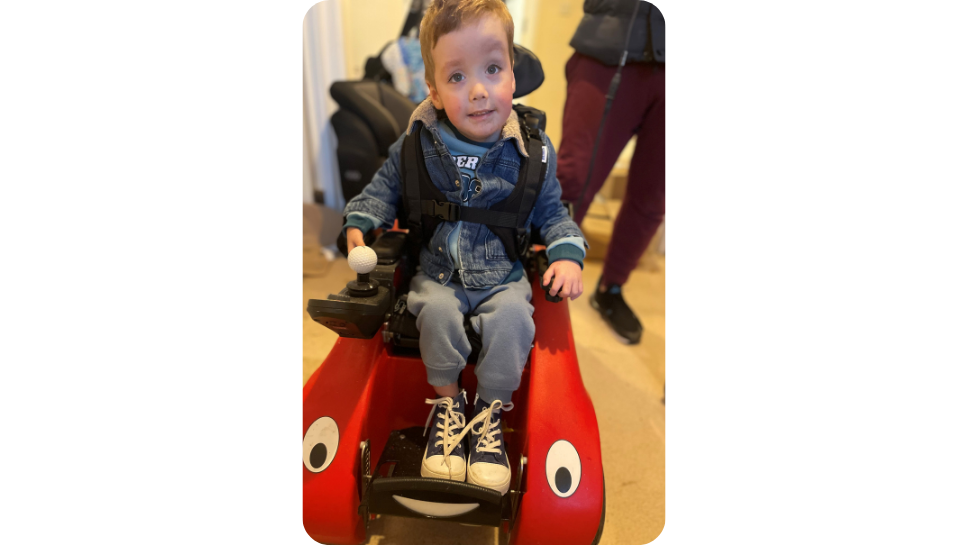
When I fell pregnant with my first son, Frankie, it felt like a miracle. I’d had five miscarriages prior to this, so me and my partner had thought we’d never be able to have children. Everyone says having a child changes your life forever, but for me that was true in more ways than one.
18 weeks pregnant and a diagnosis
I’ve had severe scoliosis (curvature of the spine) since I was a child. When I fell pregnant at 23, I was referred to Oxford University Hospital’s special maternity unit as I was classed as a high-risk pregnancy. They told me in my first appointment they thought I had more than just scoliosis. At 18 weeks pregnant I was diagnosed with Bethlem Myopathy. The consultant said it was likely Ulrich muscular dystrophy, but because I was being diagnosed as an adult, they couldn’t label it as that condition.
One diagnosis turned to three
It’s shocking to be diagnosed with a condition. But to be pregnant at the same time − I was terrified. Two weeks later they said there was a 50% chance my baby would have the condition too, and they offered me an abortion. My partner and I were so upset and hurt by how they approached this, we walked out of the appointment.
My body coped pretty well during pregnancy, but I started struggling at 27 weeks. Frankie was born at 31 weeks after I was induced. He was tested at birth, and they confirmed he had the condition too. Frankie spent 75 days in the NICU fighting infections, but he never gave up. He’s three now and learning to walk with a frame. He can bum shuffle around the house incredibly fast.
When Frankie was six months old, I fell pregnant with Freddie despite taking precautions. There were a lot of concerns about how my body would cope so soon after having Frankie. I went into labour naturally at 30 weeks and had an emergency C-section due to my spinal surgery. He had necrotizing enterocolitis (NEC) and had to have surgery to remove half his bowel. Freddie spent 99 days in the NICU after complications from the operation led to sepsis. My heart almost broke when they told me Freddie also had muscular dystrophy. It felt so unfair for them.
The boys are so alike in so many ways, but Ulrich has presented quite differently in them. Frankie has scoliosis but it hasn’t progressed in six months, which is a huge relief. I’m very strict with him wearing his brace because I know firsthand the importance of slowing down the curve. Freddie doesn’t have scoliosis but is very slow at meeting milestones. He’s only just learnt to sit up and can’t crawl or walk.
We wouldn’t be where we are now without Muscular Dystrophy UK
All of this was happening during the pandemic, so we felt even more alone and scared. We didn’t know who we could call or get help from. I first heard about Muscular Dystrophy UK when I was pregnant with Frankie. I reached out after his diagnosis for information, and then went my own way to process everything and focus on my sons. But I found stories of people that had similar conditions on the website, and they brought me so much hope.
I decided from that moment that my boy was going to be a champion like all the amazing people on the website.
Being a disabled mum

Being a mum to Frankie and Freddie is the most rewarding and biggest achievement of my life. But also the most challenging. Not being able to do certain things for my boys is emotional. Like when they put their arms out to be picked up, which I can’t do anymore. Just because you can’t do something the way someone else can, doesn’t mean you can’t do it though. I know when they want a cuddle, someone can pick them up and put them on my lap for me.
One of the most important things I’ve learnt is to not be too hard on myself. Being a mum is hard, even without the added challenges of having a condition. Everyone has bad days, and you need to look after yourself to be able to look after your family.
A huge piece of advice I would give to mums in the community is don’t be afraid to reach out to people.
I think the pressure to prove that we can cope stops us from speaking about things we’re finding hard. But it’s not a weakness to ask for help, and you’ll be amazed by how many people are more than happy to support you.
Finding Muscular Dystrophy UK helpline support
I got back in touch with the charity last year when my partner and I were struggling. We had no idea what support we were entitled to. Paige, from the helpline team, has been helping us since and she’s just phenomenal.
At the moment my partner and I do all the boys’ care. My social worker kept saying that if I ask for help, it proves to her that I can't manage my children's needs. This feels really unfair as we want to give them the best start in life possible. We do quite intense physio programmes every day for both the boys. Frankie is struggling with his lung pressure, so we use his cough assist daily. And this is on top of all the normal needs of two toddlers. So, it’s a lot. Especially as my muscles are getting worse so I can only walk short distances around the house now. But Paige is helping us fight this.
She has also been writing letters and trying to move things forward with the housing department. Our bungalow is so small that we’ve been refused mobility equipment for Frankie and Freddie as there isn’t enough space. The boys deserve a home that helps them thrive, not restricts their development. After several years and countless letters, the council has agreed that the bungalow we’re in isn’t suitable for the boys’ needs. We’re now on the waiting list to be moved to a larger property. We have no idea how long that might take, but getting to this point is a big step.
I don’t think we’d be where we are now without Muscular Dystrophy UK’s helpline and inspiring stories on the website.
